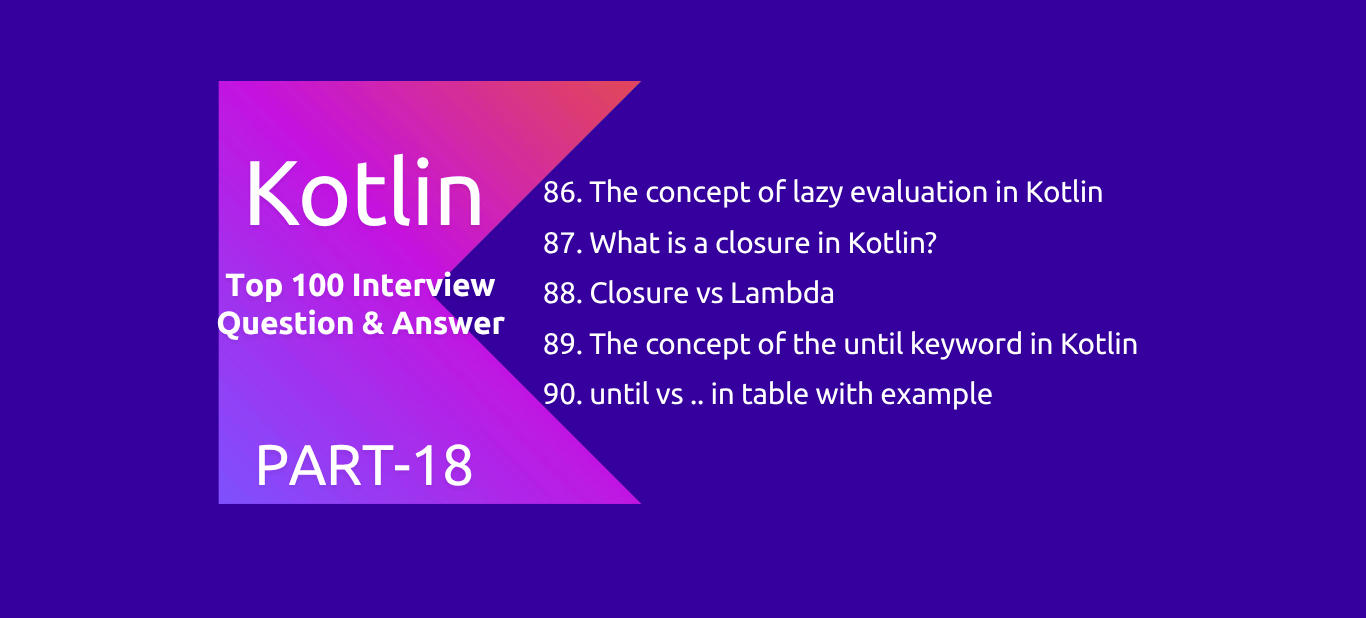Kotlin : 100 Interview Questions and Answers PART18
Kotlin is concise, expressive, and designed to improve developer productivity. It runs on the Java Virtual Machine (JVM), can be compiled to JavaScript, and supports native platforms via Kotlin/Native.

86. The concept of lazy evaluation in Kotlin
Lazy evaluation is a programming concept where a value is not computed until it is actually needed.
In Kotlin, this is implemented using the lazy delegate — a powerful and simple way to defer initialization of a property until it's first accessed.
Syntax: lazy
val myValue: String by lazy {
println("Computed!")
"Hello from Lazy"
}- - The lambda inside lazy { ... } runs only once — the first time myValue is accessed.
- - After that, the cached value is returned.
Output Example
fun main() {
println("Before access")
println(myValue) // Triggers computation
println(myValue) // Uses cached value
}
Output:
Before access
Computed!
Hello from Lazy
Hello from Lazy
How It Works
- - The lazy function returns an implementation of the Lazy<T> interface.
- - By default, it's thread-safe (LazyThreadSafetyMode.SYNCHRONIZED), but can be customized.
Common Use Cases
| Use Case | Why Use lazy? |
|---|---|
| Expensive computation | Delay until needed |
| Optional initialization | Avoid null checks |
| UI components | Avoid unnecessary inflation/setup |
| Dependency loading | Defer until accessed |
87. What is a closure in Kotlin?
A closure in Kotlin is a function that captures variables from its surrounding scope — even after that scope has exited. This allows the function to remember and access those variables later.
Closure = Lambda/function + captured environment
Example of a Closure in Kotlin
fun counter(): () -> Int {
var count = 0
return {
count += 1
count
}
}
val increment = counter()
println(increment()) // 1
println(increment()) // 2
println(increment()) // 3
What's Happening Here?
- - counter() returns a lambda.
- - That lambda remembers the variable count, even though the counter() function has finished executing.
- - count is captured by the returned function — this is the closure.
Why Closures Are Useful
- - You can maintain state between function calls
- - Useful for callbacks, event handlers, and functional programming
- - Used heavily in Kotlin DSLs, Jetpack Compose, and coroutines
Another Example: Closure with Filtering
fun makeFilter(limit: Int): (Int) -> Boolean {
return { it > limit }
}
val filter = makeFilter(10)
println(filter(5)) // false
println(filter(15)) // trueThe lambda closes over limit.
88. Closure vs Lambda
- Lambda: A small function, usually stateless
- Closure: A lambda with memory — it captures values from surrounding scope
Here's a clear comparison table showing the difference between Closures and Lambdas, particularly in Kotlin (and also applicable in general programming):
| Feature | Lambda | Closure |
|---|---|---|
| Definition | A function literal (anonymous function) | A lambda/function that captures variables from its outer scope |
| Captures outer variables? | ❌ Not necessarily | ✅ Yes — that's what defines a closure |
| Is every closure a lambda? | ❌ No (can be named function too) | ✅ Every lambda that captures state is a closure |
| Is every lambda a closure? | ❌ Only if it accesses outer scope | ✅ If it uses/captures outer variables |
| Can be assigned to variable? | ✅ Yes | ✅ Yes (if it's a function object) |
| Example (Kotlin) | val greet = { println("Hello") } | var name = "Alex"; val sayName = { println(name) } (captures name) |
| Retains state? | ❌ No state unless it's a closure | ✅ Yes — retains captured variables' state |
| Use case | Lightweight, stateless function | When you need to keep using outer/local values in a lambda |
89. The concept of the until keyword in Kotlin
In Kotlin, until is a range function used to create a range of values that is exclusive of the upper bound.
Syntax
start until endThis creates a range from start up to but not including end.
Equivalent to: start..(end - 1)
Example
for (i in 1 until 5) {
println(i)
}
Output:
1
2
3
4As you can see, 5 is not included.
When to Use until
- Avoiding off-by-one errors when working with ranges.
- Looping over indices of a list or array (excluding lastIndex + 1):
val list = listOf("a", "b", "c")
for (i in 0 until list.size) {
println(list[i])
}
90. until vs .. in table with example
Here's a clear comparison between Kotlin's .. and until operators using a table, along with examples:
| Feature | .. (Range To) | until (Exclusive Range) |
|---|---|---|
| Meaning | Includes the end value | Excludes the end value |
| Syntax | start..end | start until end |
| Includes last number? | ✅ Yes | ❌ No |
| Use case | When you want to include the upper bound | When you want to exclude the upper bound |
| Type | IntRange, CharRange, etc. | IntRange under the hood |
Examples:
Using ..
for (i in 1..5) {
print("$i ")
}
Output: 1 2 3 4 5Includes 5
Using until
for (i in 1 until 5) {
print("$i ")
}
Output: 1 2 3 4Excludes 5
Important :
| Expression | Includes end? | Example | Iterates Over |
|---|---|---|---|
| 1..5 | ✅ Yes | for (i in 1..5) | 1 2 3 4 5 |
| 1 until 5 | ❌ No | for (i in 1 until 5) | 1 2 3 4 |